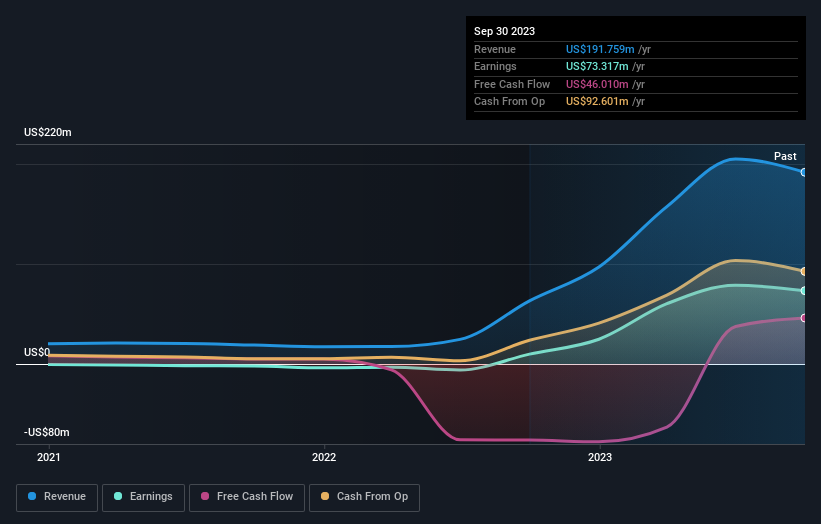Private companies own 30% of Imperial Petroleum Inc. (NASDAQ:IMPP) shares but individual investors control 57% of the company
Key Insights
Significant control over Imperial Petroleum by individual investors implies that the general public has more power to influence management and governance-related decisions
The top 25 shareholders own 43% of the company
Ownership research, combined with past performance data can help provide a good understanding of opportunities in a stock
A look at the shareholders of Imperial Petroleum Inc. (NASDAQ:IMPP) can tell us which group is most powerful. And the group that holds the biggest piece of the pie are individual investors with 57% ownership. In other words, the group stands to gain the most (or lose the most) from their investment into the company.
Meanwhile, private companies make up 30% of the company’s shareholders.
In the chart below, we zoom in on the different ownership groups of Imperial Petroleum.
View our latest analysis for Imperial Petroleum
What Does The Institutional Ownership Tell Us About Imperial Petroleum?
Many institutions measure their performance against an index that approximates the local market. So they usually pay more attention to companies that are included in major indices.
Imperial Petroleum already has institutions on the share registry. Indeed, they own a respectable stake in the company. This suggests some credibility amongst professional investors. But we can't rely on that fact alone since institutions make bad investments sometimes, just like everyone does. It is not uncommon to see a big share price drop if two large institutional investors try to sell out of a stock at the same time. So it is worth checking the past earnings trajectory of Imperial Petroleum, (below). Of course, keep in mind that there are other factors to consider, too.
Imperial Petroleum is not owned by hedge funds. Looking at our data, we can see that the largest shareholder is Flawless Management,Inc with 22% of shares outstanding. With 8.4% and 4.0% of the shares outstanding respectively, Arethusa Properties Ltd. and Harry Vafias are the second and third largest shareholders. Harry Vafias, who is the third-largest shareholder, also happens to hold the title of Member of the Board of Directors.
A deeper look at our ownership data shows that the top 25 shareholders collectively hold less than half of the register, suggesting a large group of small holders where no single shareholder has a majority.
While it makes sense to study institutional ownership data for a company, it also makes sense to study analyst sentiments to know which way the wind is blowing. Our information suggests that there isn't any analyst coverage of the stock, so it is probably little known.
Insider Ownership Of Imperial Petroleum
While the precise definition of an insider can be subjective, almost everyone considers board members to be insiders. Management ultimately answers to the board. However, it is not uncommon for managers to be executive board members, especially if they are a founder or the CEO.
I generally consider insider ownership to be a good thing. However, on some occasions it makes it more difficult for other shareholders to hold the board accountable for decisions.
We can see that insiders own shares in Imperial Petroleum Inc.. In their own names, insiders own US$5.2m worth of stock in the US$106m company. This shows at least some alignment, but we usually like to see larger insider holdings. You can click here to see if those insiders have been buying or selling.
General Public Ownership
The general public, mostly comprising of individual investors, collectively holds 57% of Imperial Petroleum shares. This level of ownership gives investors from the wider public some power to sway key policy decisions such as board composition, executive compensation, and the dividend payout ratio.
Private Company Ownership
We can see that Private Companies own 30%, of the shares on issue. It's hard to draw any conclusions from this fact alone, so its worth looking into who owns those private companies. Sometimes insiders or other related parties have an interest in shares in a public company through a separate private company.
Next Steps:
While it is well worth considering the different groups that own a company, there are other factors that are even more important. For example, we've discovered 1 warning sign for Imperial Petroleum that you should be aware of before investing here.
Of course this may not be the best stock to buy. Therefore, you may wish to see our free collection of interesting prospects boasting favorable financials.
NB: Figures in this article are calculated using data from the last twelve months, which refer to the 12-month period ending on the last date of the month the financial statement is dated. This may not be consistent with full year annual report figures.
Have feedback on this article? Concerned about the content? Get in touch with us directly. Alternatively, email editorial-team (at) simplywallst.com.
This article by Simply Wall St is general in nature. We provide commentary based on historical data and analyst forecasts only using an unbiased methodology and our articles are not intended to be financial advice. It does not constitute a recommendation to buy or sell any stock, and does not take account of your objectives, or your financial situation. We aim to bring you long-term focused analysis driven by fundamental data. Note that our analysis may not factor in the latest price-sensitive company announcements or qualitative material. Simply Wall St has no position in any stocks mentioned.

 Yahoo Finance
Yahoo Finance 

